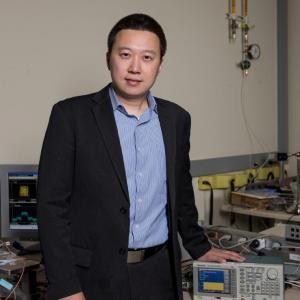
Hua Wang
Associate Professor, School of Electrical and Computer Engineering
Director, GT Center of Circuits and Systems
Wang received his B.Sc. from Tsinghua University, Beijing, China, in 2003, and the M.S. and Ph.D. degrees in electrical engineering from the California Institute of Technology, Pasadena, in 2007 and 2009, respectively. During the summer of 2004, he was with Guidant Corporation (later acquired by Boston Scientific), working on accelerometer systems for implantable biomedical devices. In 2010, he joined Intel Corporation. His work at Intel included the next-generation energy-efficient mm-Wave communication link and broadband Semiconductors Font-End-Modules for Wi-Fi systems. In May 2011, he joined Skyworks Solutions, where he led the development of SAW-less integrated filter solutions for low-cost cellular-standard power amplifier Front-End-Modules. In spring 2012, he joined the School of Electrical and Computer Engineering at Georgia Institute of Technology as an assistant professor. Wang is generally interested in innovating and engineering mixed-signal, RF, and mm-Wave integrated systems for wireless communication and bioelectronics applications. He is a member of Sigma Xi, the IEEE Solid-State Circuits Society, and the IEEE Microwave Theory and Techniques Society.
404.385.6003
Office Location:
TSRB 534
Georgia Institute of Technology
- Broadband and energy-efficient RF/mm-Wave integrated circuits and systems
- Self-healing integrated systems for communication, radar, and biosensing
- Sub-TeraHz system integration for spectroscopy and imaging
- Hand-held Point-of-Care (PoC) sensing platforms for biomedical and environmental applications
- Fundamental noise modeling in high-precision measurements
IRI Connection:




